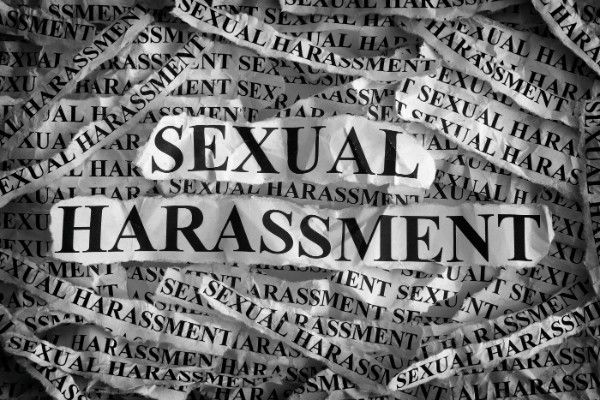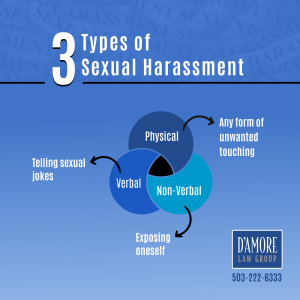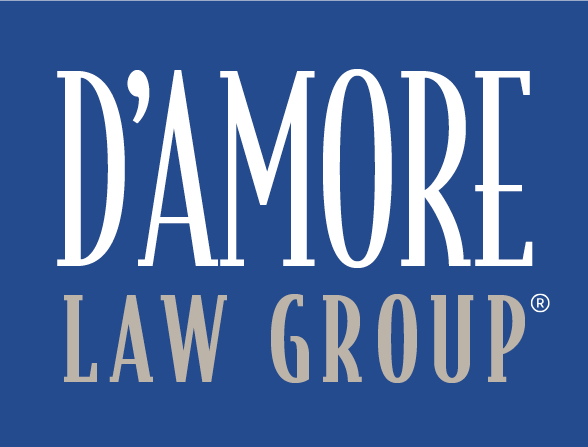You do what you can to make sure your children are safe. Unfortunately, you cannot be there to protect your children every minute they are at school. School is...
Read more
What Are the Different Types of Sexual Harassment?
Sexual harassment is unacceptable in any setting, whether at work, in public, or elsewhere. Understanding the different types of sexual harassment can help you recognize when it occurs and take action. If you or a loved one believe you may be a victim of sexual harassment, it’s crucial to speak up. We encourage you to schedule a confidential consultation with one of our attorneys as soon as possible. Contact us today at 503-222-6333 to discuss your case and learn how we can help you.
Key Takeaways
- Sexual harassment occurs in three primary forms: verbal (e.g., sexual jokes or comments), non-verbal (e.g., explicit messages, gestures, or stalking), and physical contact (e.g., unwanted touching or kissing).
- In the workplace, two major legal categories exist: quid pro quo harassment (job benefits tied to sexual favors) and hostile work environment harassment (pervasive conduct that makes the workplace intimidating or offensive).
- Sexual harassment is unlawful and victims have rights, including the ability to hold perpetrators—and in many cases, their employers—accountable under state and federal law.
3 Types of Sexual Harassment

Unwelcome behavior includes abusive conduct and harassment. While most employees recognize harassment, especially sexual harassment, abusive conduct is less familiar.
In legal terms, sexual harassment is considered a form of sexual abuse. Not only is sexual harassment inappropriate, but it is also unlawful, and in appropriate cases, perpetrators can be held accountable in both civil and criminal court. When sexual harassment occurs in the workplace (or any time while the perpetrator is working), the perpetrator’s employer can be held liable as well, and there are multiple state and federal laws that provide special protections to employees who are sexually harassed on the job.
Broadly speaking, there are three forms of sexual harassment. These are: (i) verbal sexual harassment, (ii) non-verbal sexual harassment, and (iii) physical sexual contact.
1. Verbal Sexual Harassment
Sexual assault involves physical acts like unwanted touching, kissing, and groping, while harassment can include verbal actions.
Verbal sexual harassment involves saying anything of a sexual nature to someone who is an unwilling recipient. If someone else says something to you that is either explicitly sexual or sexually-suggestive, and if what they say makes you uncomfortable, then you may be a victim of sexual harassment. Examples of verbal sexual harassment include:
- Requesting sexual favors
- Expressing a desire for sexual contact or conduct
- Using sexually-explicit language
- Telling sexual jokes
- Commenting on a person’s appearance
- Speaking in a sexual tone
- Using sexually-suggestive nicknames or terms of endearment
Not every sexually-charged comment rises to the level of sexual harassment, and the perpetrator’s intent can be a factor in some cases (e.g., if someone tells a sexual joke believing that it will be found funny, not offensive). However, there is a line that can be easily crossed; and, for individuals who feel that they have been victimized by verbal sexual harassment, it is important to consult with an attorney promptly.
2. Non-Verbal Sexual Harassment
Non-verbal sexual harassment is any form of unwanted sexual communication or conduct that involves something other than verbal speech but falls short of physical sexual contact. This includes sending emails and text messages that are sexually explicit or otherwise sexual in nature, as well as acts such as:
- Exposing oneself
- Blocking a hallway or doorway
- Blowing kisses or winking
- Showing sexually-explicit videos
- Staring, following, or stalking
Here, too, a single act of non-verbal sexual harassment will not necessarily give rise to a legal claim – although it is a possibility, depending on the circumstances involved. If you have any evidence (e.g., an email or text message), you should keep it to share with your attorney; and, if anyone saw what happened, he or she could serve as an important witness in your sexual harassment case as well.
Visual sexual harassment includes lewd gestures and non-verbal acts that convey offensive sexual content or intent.
3. Physical Sexual Contact
Physical sexual harassment is unwelcome contact of a sexual nature, including touching, hugging, groping, kissing, or rubbing against someone. It creates a hostile or intimidating environment. It ranges from minor acts like unwanted shoulder rubs to severe actions like sexual assault, especially when no consent is given.
Examples of physical contact that can constitute sexual harassment, or that can blur the line between sexual harassment and sexual assault, include:
- Any form of unwanted touching
- Patting, grabbing, rubbing, or pinching
- Hugging or kissing
No matter where you are or what you are doing, you do not have to accept unwanted physical sexual contact. You have the right to your own personal sovereignty, and you cannot legally be forced to submit to unwanted physical sexual contact as a condition to receiving a job opportunity or anything else. If you or someone you care about has been victimized, a lawyer can help, and we strongly encourage you to contact a lawyer right away.
Sexual Harassment in the Workplace
Unlawful sexual harassment is unwelcome sexual conduct that disrupts work, affects employment decisions, or creates a hostile environment. It violates Title VII of the Civil Rights Act. Harassment is illegal if severe or frequent enough to change job conditions. It includes quid pro quo or hostile environment harassment.

- Quid Pro Quo Sexual Harassment – Quid pro quo is a Latin phrase that means, “this for that” or, “a favor for a favor.” In the employment context, quid pro quo sexual harassment typically involves a supervisor, manager, or executive offering an employment opportunity on the condition that the subordinate employee consents to sexual advances, contact, or conduct. This can involve either an overt request (e.g., “I’ll give you a promotion if . . . .”), or suggestive words or conduct that indicate that the superior is willing to provide an employment opportunity if a subordinate or candidate “offers” a sexual favor.
- Hostile Work Environment – A hostile work environment exists when instances of harassment, which may be insufficient to support legal claims on their own, are so pervasive that they make an employee uncomfortable returning to work each day. The instances of harassment do not have to involve – and generally do not involve – a quid pro quo. For example, if an employee is repeatedly subjected to unwanted sexual advances or regularly receives offensive emails or texts from a coworker (or multiple coworkers), this could create a hostile work environment.
Regardless of the specific circumstances involved, if you feel as though you have been sexually harassed, or if you are concerned that a loved one may be a victim, you should seek help promptly. At D’Amore Law Group, we represent victims of sexual harassment and sexual abuse throughout Oregon and Washington, and one of our attorneys will be happy to speak with you in person or over the phone in complete confidence.
Book a Free, Confidential Consultation with a Trusted Sexual Harassment Lawyer in Oregon or Washington
If you want to discuss your legal rights or those of a loved one regarding types of sexual harassment, contact a harassment lawyer at D’Amore Law Group. You can call us directly or request a free, confidential consultation online today.
